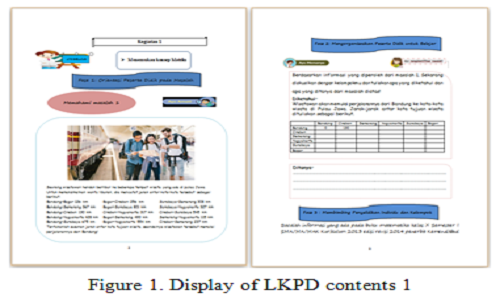
Development of Mathematics Learning Tools with Problem Based Learning Model on Matrix Material to Facilitate Students' Critical Thinking Ability
Abstract
The ability of students to think critically in mathematics is is still low. The lack of learning tools that are considered to facilitate students' mathematical critical thinking skills is one of the cause it. The purpose of this study was to develop a mathematics learning tool with a quality problem-based learning (PBM) model to facilitate students' mathematical critical thinking skills. The learning tools developed consisted of a syllabus, lesson plans (RPP) and student worksheets (LKPD) on the matrix material for class X SMK. This research was a development research using the Borg and Gall model. The development consists of six stages, namely: 1) research and data collection; 2) planning; 3) development of the initial product draft; 4) initial field trials; 5) revised trial results; and 6) dissemination and implementation. The subject of this research trial was the students of SMK Nurul Falah Pekanbaru. The instrument used was validation instrument for the syllabus, lesson plans, and student worksheet. Based on the results of the validation data analysis, it shows that the learning tools developed were very valid. The results of the validation of the syllabus were 85.11; the average RPP score was 86.02; and the average LKPD score was 86.40. The average student response questionnaire to the initial field trial was 85.93 with the very practical category. The learning device developed was valid and practical for use by class X SMK students.
Keywords
Full Text:
PDFReferences
Afdareza, M. Y., Yuanita, P., & Maimunah, M. (2020). Development of Learning Device Based on 21st Century Skill with Implementation of Problem Based Learning to Increase Critical Thinking Skill of Students on Polyhedron for Grade 8th Junior High School. Jurnal of Educational Sciences, 4(2), 273-284.
Akbar, S., (2013). Instrumen Perangkat Pembelajaran. Rosdakarya: Bandung.
Armis, A., & Suhermi, S. (2017). Pengembangan Perangkat Pembelajaran Matematika Berbasis Problem Based Learning untuk Siswa Kelas VIII Semester 1 SMP/MTs Materi Bilangan dan Himpunan. Jurnal Pendidikan Matematika dan Ilmu Pengetahuan Alam, 5 (1), 25-42.
Atika, N., Roza, Y., & Murni, A. (2020). Development of Learning Tools by Application of Problem Based Learning Models to Improve Mathematical Communication Capabilities of Sequence and Series Materials. Jurnal of Educational Sciences, 4(1), 62-72.
Facione, P. A. (1990). Critical thinking: a Statement of Expert Consensus for Purpuses of Educational Assessment and Instruction. The Delphi Report. California: California Academic Press. ERIC Doc. No.: ED 315 423.
Fakriyah, F. (2014). Penerapan Problem Based Learning Dalam Upaya Mengembangkan Kemampuan Berpikir Kritis Mahasiswa. Jurnal Pendidikan IPA Indonesia, 3 (1), 95-101.
Fisher, A. (2004). Critical Thinking An Introduction. Cambridge: University Press, 2004.
Fitria, R., Hutapea, N. M., & Zulkarnain, Z. (2020). Development of Learning Devices by Appliying Problem Based Learning to Increase Students Mathematical Solving Skills of Class VII Junior High School. Jurnal of Educational Sciences, 4(2), 368-379.
Heleni, S., & Zulkarnain, Z. (2018). The Influence of Mathematical Thinking Ability with Modified MOORE Method on Learning Outcomes Of Mathematic II Chemical Education Students. Jurnal of Educational Sciences, 2(2), 33-41.
Karim, K. (2015). Kemampuan Berpikir Kritis Siswa Dalam Pembelajaran Matematika dengan Menggunakan Model Jucama Di Sekolah Menengah Pertama. Jurnal Pendidikan Matematika, 3(1), 92-104.
Mulyatiningsih, E. (2012). Metode Penelitian Terapan Bidang Pendidikan. Bandung: Alfabeta.
Mulyatiningsih, E. (2014). Metode Penelitian Terapan Bidang Pendidikan. Yogyakarta: Alfabeta.
Nazarudin, N. (2007). Manajemen Pembelajaran: Implementasi konsep, Karakteristik, dan Metodologi Pendidikan. Sukses, Yokyakarta.
Nurafiah, F. (2013). Perbandingan Peningkatan Kemampuan Berpikir Kritis Siswa SMP Antara yang Memperoleh Pembelajaran Means-Ends Analysis (MEA) dan Problem Based Learning (PBL), Jurnal Pengajaran MIPA, 18 (1), 1-8.
Ramziah, S. (2016). Peningkatan Kemampuan Representasi Matematis Siswa Kelas X2 SMAN 1 Gedung Meneng Menggunakan Bahan Ajar Matriks Berbasis Pendekatan Saintifik, Jurnal Pendidikan Matematika STKIP Garut, 5 (2), 138-147.
Reta, I. K. (2012). Pengaruh Model Pembelajaran Berbasis Masalah terhadap Keterampilan Berpikir Kritis ditinjau dari Gaya Kognitif Siswa. Jurnal Pendidikan dan Pembelajaran IPA, 2 (1), 1-17.
Sari, D. S. (2015). Pengembangan Multimedia Berbasis Masalah Untuk Meningkatkan Motivasi Belajar dan Kemampuan Berpikir Kritis Siswa. Jurnal Inovasi Pendidikan IPA, 1 (2), 153-166.
Sulistyani, N. (2015). Pengembangan Perangkat Pembelajaran Bangun Ruang Di SMP dengan Pendekatan Problem Based Learning. Jurnal Riset Pendidikan Matematika, 2(2), 197-210.
Syahbana, Ali. (2012). Peningkatan Kemampuan Berpikir Kritis Matematis Siswa SMP Melalui Pendekatan Contextual Teaching and Learning, Edumatica, 2(2), 17-26.
Putri, A., Kartini, K., & Yuanita, P. (2020). Development of Learning Tool based on the Discovery Learning Model Integrating 21st Century Skills in Trigonometric Materials in High Schools. Jurnal of Educational Sciences, 4(4), 864-880.
Putri, A., Roza, Y., & Maimunah, M. (2020). Development of Mathematics Learning Tools with Discovery Learning Model to Improve the Critical Thinking Ability of Mathematics. Jurnal of Educational Sciences, 4(1), 83-92.
Zulfah, Z. (2017). Tahap Plemilinery Research Pengembangan LKPD Berbasis PBL untuk Materi Matematika Semester 1 Kelas VIII SMP, Jurnal Cendekia: Jurnal Pendidikan Matematika, 1(2), 1-12.
DOI: http://dx.doi.org/10.31258/jes.5.1.p.156-165
Refbacks
- There are currently no refbacks.
Copyright (c) 2021 Wiyana Pertiwi, Yenita Roza, Putri Yuanita

This work is licensed under a Creative Commons Attribution 4.0 International License.
Publisher: FKIP Universitas Riau












